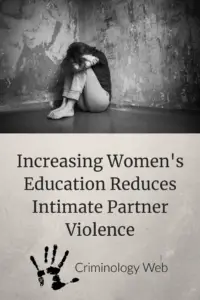
Increasing women’s education protects them from intimate partner violence. That was shown in a recent study published in the journal Criminology.
Intimate Partner Violence
Intimate partner violence is a considerable problem around the world. It can include psychological, physical, and sexual violence. It is well known that intimate partner violence can have detrimental consequences for its victims. Hence, policy workers have long tried to design and implement strategies to reduce violence between intimate partners. One of those strategies could be educational in nature. But until recently, whether and how increased education among women could lead to less intimate partner violence remained a question.
Schooling Reform Affects Intimate Partner Violence
To answer that question, sociologist Abigail Weitzman analyzed a large survey among women from Peru. Peru has one of the highest rates of intimate partner violence in the world. No less than 39% of Peruvian women said that they had experienced physical violence by their intimate partner, including slapping, pushing, punching, and kicking. In addition, 10% of women had experienced sexual violence by their partner. Regarding psychological violence by their intimate partners, 33% of women had experienced humiliations or threats.
Peru experienced a major schooling reform in the 1990s, when compulsory schooling was extended by five years (from a total of six to eleven years). This schooling reform especially impacted girls in the country, as they had historically received less education than boys.
Weitzman compared the women who had completed their education before this major school reform happened with the women who were part of the reform. The results of her analysis show that the school reform reduced intimate partner violence in the country.
More specifically, increasing a woman’s education by one year reduced physical violence by 7 to 8%, sexual violence by 10 to 25%, and psychological violence by 6%.
Education Makes Women Less Dependent
The study shows that extending women’s education has several advantages that ultimately lead to less intimate partner violence. Extending women’s education increases their occupational status and thereby makes them less dependent on their partners. Women with more education are therefore better able to leave abusive relationships. Of equal importance is that a longer education often means that marriage and childbearing are delayed. That gives women more time to build a career, which makes them more self-sufficient while at the same time leading to a more equal relationship between partners. Finally, women who are more educated more often marry partners with higher education. This implies a lower chance that a woman will end up in a poor household with financial conflicts, which may ultimately lead to violent conflicts.
In sum, the results of this study provide evidence that increasing women’s education protects them against violence by their intimate partners. This finding may be especially important for countries where women receive only limited education and where rates of intimate partner violence are high. Increasing women’s education may be a promising pathway to reducing intimate partner violence in these places.
Study reference
Weitzman, A. (2018). Does increasing women’s education reduce their risk of intimate partner violence? Evidence from an education policy reform. Criminology, 56:3, 574-607. DOI: 10.1111/1745-9125.12181
LINK


Education solves almost all the problems that our society faces nowadays. Apart from the education for girls, we should work on providing necessary education to our boys as well. Teaching about the severity of domestic violence from an early age can be really helpful.
Abby recently posted…Best 59 Educational toys for 7 year olds| Building| Problem solving, Logic
Hi Abby, I totally agree. Early educational programs can be very helpful, also for reducing violence. Your website offers great insights into educational tools!